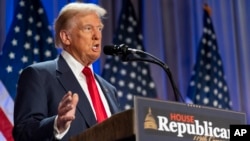U.S. President-elect Donald Trump pledged Monday to quickly impose tariffs on China, Mexico and Canada – the country’s top three trade partners – raising the prospect of trade wars and higher prices for U.S. consumers.
Trump used a series of posts on his Truth Social account to announce the moves, including saying on his first day in office he will “sign all necessary documents to charge Mexico and Canada a 25 percent tariff on ALL products coming into the United States, and its ridiculous Open Borders.”
He said the tariffs would remain in place until “Drugs, in particular Fentanyl, and all Illegal Aliens stop this Invasion of our Country!” Trump said Mexico and Canada have the ability to “easily solve this long simmering problem.”
He also complained about what he said was China’s role in “the massive amounts of drugs, in particular Fentanyl, being sent into the United States.”
“Until such time as they stop, we will be charging China an additional 10% Tariff, above any additional Tariffs, on all of their many products coming into the United States of America,” Trump wrote.
China responded by saying “no one will win” a trade or tariff war.
"China believes that China-U.S. economic and trade cooperation is mutually beneficial in nature," Liu Pengyu, a spokesman for China's embassy in the United States, said.
The United States, Mexico and Canada signed a new trade deal during Trump’s previous term in office, a deal that will be up for review in 2026.
The deal does allow for national security exemptions for restrictions.
Trump and Canadian Prime Minister Justin Trudeau discussed trade and border security after Trump announced his plans Monday, a Canadian source familiar with the situation said.
The new U.S. leader does not take office for two months, leaving space for negotiations and potential changes to the Trump administration’s plans.
Trump’s nominee to lead the Treasury Department, Scott Bessent, wrote in a Fox News op-ed last week that tariffs can be “a useful tool for achieving the president’s foreign policy objectives,” including getting another government to boost defense spending or take action on drug trafficking.
Canadian Deputy Prime Minister Chrystia Freeland and Public Safety Minister Dominic LeBlanc issued a joint statement late Monday stressing the close ties between the U.S. and Canada, including Canadian energy exports to the U.S. and cooperation on stopping drug trafficking.
"Our relationship today is balanced and mutually beneficial, particularly for American workers. Today, Canada buys more from the United States than China, Japan, France and the UK combined," the statement said.
Tariffs are paid by companies that import the products, meaning that if implemented, those costs could be passed on in the form of higher prices for people buying a range of goods including gas, cars and food
Trump used tariffs as part of his economic agenda during his previous administration, with a particular focus on goods from China. The Chinese government responded with its own tariffs on U.S.-made products.
He also focused on security at the U.S.-Mexico border, ordering the construction of a more extensive network of border walls and demanding the Mexican government take steps to remove migrants from areas near the U.S. border.
Trump’s latest demands come at a time when arrests for illegal crossings at the border have been declining, with figures from October showing arrests were near four-year lows.
Some information for this story was provided by The Associated Press, Agence France-Presse and Reuters

Forum